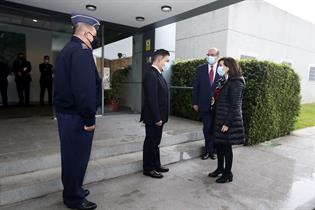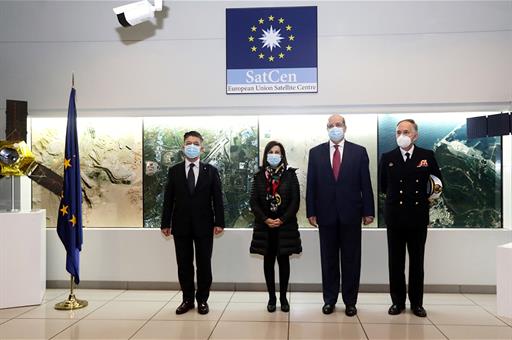Margarita Robles wished to "convey Spain's satisfaction and pride" over the fact that this centre is located in Spain and stressed that the work being done there is "essential" to much of what the EU does.
She also said that this centre demonstrates Spain's firm commitment to the European institutions. "We believe that Spain is and will continue to be a greater country through its involvement in the EU, the work we are doing with all the Member States, and this centre is a highly significant demonstration of that", she said.
The Spanish minister reported that she spoke last night with the High Representative of the Union for Foreign Affairs and Security Policy, Josep Borrell, to tell him about this visit and to highlight that "Spain is firmly committed to European military health", something about which the High Representative agrees. Josep Borrell has committed to leading that European military health project through PESCO policies.
Margarita Robles also spoke about the 2021 budget and called on political forces to "avoid using it for partisan purposes".
"At the end of the day, the defence budget equals security, for making a freer world, a safer world, and when health problems arrived, we've had our Armed Forces to help", she said.
The Spanish Minister for Defence called for recognition of the "generosity" shown by the Armed Forces to the public and said that, "although we sometimes have to tighten our belts, they will always be there to serve the people of Spain, irrespective of any political confrontation".
Margarita Robles was met by the centre's director, the Rumanian ambassador Sorin Ducaru, who provided a general overview of its mission and how it operates using information mainly taken from Earth observation satellites. Its services are based on the use of space resources and collateral data, such as aerial or satellite images.
The director went on to stress that this centre provides political leaders with an early warning service about possible crises in order to get ahead of the curve and enable the pertinent measures to be adopted.
The Spanish minister was then told more about the specific applications and analyses conducted at SatCen. The Assistant Operations Director, the Spanish citizen Álvaro Rodríguez, explained the work being done at the moment for Spain within the framework of the European Union Common Security and Defence Policy (CSDP).
Along the same lines, Álvaro Rodríguez told the Minister for Defence about the contributions from this centre to Operation IRINA, the support for Spain as a Member State via the Intelligence Centre of the Armed Forces and how it works with the Military Emergencies Unit (UME) or Spanish Guardia Civil, among other issues.
The visit was also attended by the Secretary-General for Defence Policy, Admiral Juan Francisco Martínez Núnez.
EU Geospatial Intelligence Agency
 The Satellite Centre (SatCen) was set up in 1992 as an analysis tool for the WEU (Western European Union).
The Satellite Centre (SatCen) was set up in 1992 as an analysis tool for the WEU (Western European Union).
In 2002, it became part of the European Union and is today the EU's geospatial intelligence agency.
Its main mission is to support decision-making at various levels within the Common Security and Defence Policy (CSDP) of the Union, including support for the various missions and operations that make up this policy, such as IRINI, ATALANTA and EUTM Mali.
The European Union Satellite Centre operates under supervision from the EU Political and Security Committee (COPS) and leadership from the High Representative, Josep Borrell. It is located at the Torrejón Air Base in Madrid.
Non official translation





